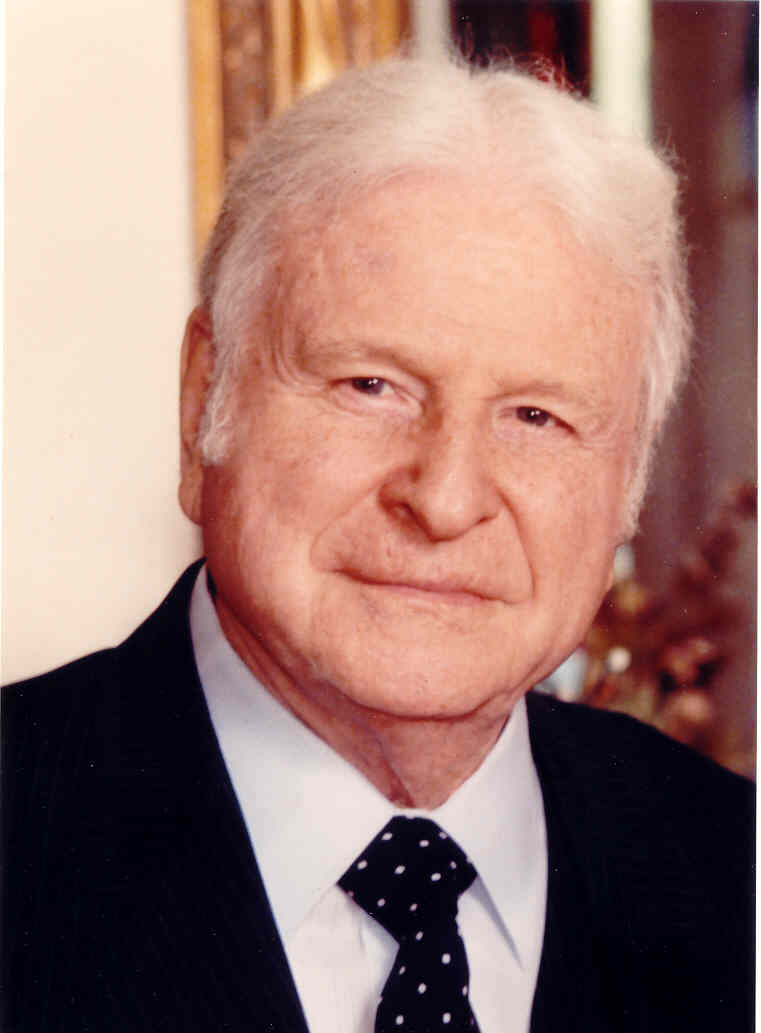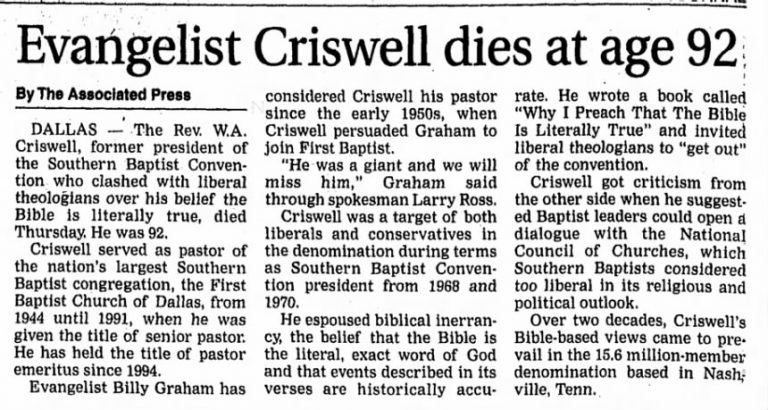Wallie Amos (W. A.) Criswell Jr.
“He was our Apostle Paul … he led with intellectual pursuit coupled with a passionate heart.”
(Anonymous)
Early Life and Call
Wallie Amos Criswell Jr., widely known as W. A. Criswell, was born December 19, 1909, in Eldorado, Oklahoma, to Wallie Amos Criswell Sr. and Anna Currie Criswell. When he was six the family moved to Texline, Texas (in the Panhandle) where his father worked as a barber-cowboy and the family experienced the economic hardship of that region. At the age of ten, young Criswell professed faith in Christ at a revival meeting, and by age twelve he felt the call to full-time gospel ministry. He was licensed to preach at age 17 and held part-time pastorates while studying.
Criswell entered Baylor University (Waco, Texas), graduating magna cum laude around 1931. He then pursued graduate theological training at Southern Baptist Theological Seminary in Louisville, Kentucky, earning a Th.M and a Ph.D. by 1937. These academic achievements gave him a solid foundation for both preaching and scholarly work despite humble beginnings.
Pastoral Progression and Dallas Call
After seminary, Criswell served pastorates in Oklahoma—first in Chickasha (1937–41) and then in Muskogee (1941–44) before being called in 1944 to the prestigious First Baptist Church of Dallas in Dallas, Texas, succeeding the legendary George W. Truett. At only about age 34, Criswell assumed this significant role and would spend the remainder of his ministry there.
During his tenure at First Baptist Dallas the congregation expanded dramatically: from about 5,000 members in 1944 and an annual budget of around $150,000, to about 26,000 members and a budget exceeding $11 million. Under his leadership, the church embraced aggressive evangelism, expository preaching, youth ministry, and expanded facilities including mission outposts and social service ministries.
Preaching, Teaching & Institutional Influence
Criswell became renowned for his expository preaching—systematically preaching through books of the Bible, verse by verse, in many cases over several years. He authored more than 50 books, including Why I Preach That the Bible Is Literally True, Acts: An Exposition and the multi-volume Great Doctrines of the Bible.
In 1970, he founded Criswell College (in Dallas) to train pastors and Christian workers in a theologically conservative and evangelistic mold—further extending his influence beyond the local pulpit. He also served two terms as president of the Southern Baptist Convention (SBC), from 1968–1970, during a time of denominational transition toward theological conservatism and renewed emphasis on biblical authority.
Theological Convictions and Controversies
Criswell held firmly to the doctrine of biblical inerrancy—believing the Bible to be the exact, authoritative Word of God. His preaching often emphasized evangelism, the lordship of Jesus Christ, and the authority of Scripture.
However, Criswell’s legacy comes with complexities. In earlier years, he made statements opposing forced racial integration; for example he once called integration “idiocy,” though later in his ministry he renounced segregation and affirmed unity in Christ across racial lines. Some critics note that his leadership and influence contributed to the conservative resurgence within the SBC, a movement that transformed denominational life but also caused significant conflict.
Legacy and Continuing Significance
Criswell died on January 10, 2002, at age 92. His funeral drew thousands and was covered nationally.
His enduring legacy can be observed in several areas:
- Expository Preaching Model: Many pastors regard his preaching style—deeply grounded in text, rich in application, animated in delivery—as a model for faithful pulpits.
- Church Growth and Institution Building: First Baptist Dallas under his leadership became a model for large-scale congregations grounded in conservatively rooted theology and broad ministry.
- Denominational Impact: His leadership in the SBC helped steer the denomination toward a conservative theological identity—reshaping seminaries, mission boards and governance.
- Training of Leaders: Through Criswell College, publications and preaching, his influence extended into generations of pastors, missionaries and teachers.
- Social Outreach: While his early positions on race and politics were controversial, he later oversaw ministries to the homeless, inner-city mission churches, and special programs for the deaf and youth—demonstrating a broader ministry vision.
Practical Lessons for Today
From Criswell’s life several practical lessons emerge:
- Commitment to Scripture Matters: He believed that solid biblical exposition reaches hearts and transforms lives—reminding pastors today that the text should be central, not peripheral.
- Long-Term Vision Yields Impact: Serving one congregation for decades allowed Criswell to build deep roots, adapt over time, and develop legacy ministry structures.
- Institutional Responsibility: Criswell understood that preaching alone wasn’t enough—he built educational institutions, missions, and church services to carry the message.
- Growth Needs Grounding: The rapid expansion of his church was matched by disciplinary safeguards (Sunday School structure, evangelistic outreach, youth programs), showing growth coupled with depth.
- Legacy Includes Complexity: Criswell’s early views on race and his dominant role in the church’s leadership raise questions of power, privilege and transformation—reminding ministry leaders that influence carries responsibility and that convictions may need evolving grace.
Conclusion
A. Criswell’s life embodies a blend of humble beginnings, passionate preaching, institutional vision and denominational leadership. From the dust-bowl plains of Texas and Oklahoma to the pulpit of one of America’s largest Baptist congregations, his journey speaks of a deep belief in the power of God’s Word and the calling to equip ministers and churches for gospel truth.
While his ministry story is not without its controversies, his influence on evangelicalism—particularly within the Southern Baptist tradition—is significant. Pastors who examine his sermons, students who attend Criswell College, congregations who adopt expository preaching—though none may exactly replicate him—still operate in the shadow of his legacy.
In today’s rapidly changing religious landscape, Criswell’s emphasis on faithfulness, Scripture, institutional responsibility and evangelistic urgency remains a resource. His life reminds us that ministry is more than charisma—it is perseverance, an unwavering commitment to the Word, and thoughtful engagement with culture. For those seeking to understand how one pastor can impact a denomination, a city and many lives, W. A. Criswell stands as a towering, yet human, example.
_____
Image Source/Credit (in order):
- Wikipedia contributors. File:W.A. Criswell.jpg – Wikipedia. en.wikipedia.org/wiki/File:W.A._Criswell.jpg.
- Newspapers.com, The Salina Journal, January 12, 2002, https://www.newspapers.com/article/the-salina-journal/191096084/
Related
Sorry, no records were found. Please adjust your search criteria and try again.
Sorry, unable to load the Maps API.

